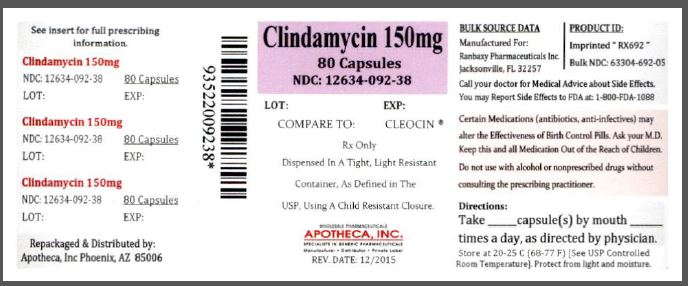
Clindamycin Hydrochloride Capsule while Breastfeeding
What is Clindamycin Hydrochloride Capsule used for?
Clindamycin Hydrochloride Capsule while breastfeeding safe or not? Can there be any side effects for infant while using it during breastfeeding?

Nursing Mothers Clindamycin has been reported to appear in breast milk in the range of 0.7 to 3.8 mcg/mL.
Clindamycin Hydrochloride Capsule Breastfeeding Analsys
Clindamycin while Breastfeeding
Low RiskCAS Number: 18323-44-9
Lincosamide antibacterial. Excreted in non-significant level into breast milk. Except for few cases of enterocolitis due to disturbance of intestinal flora no other harm effects have been shown in breastfed infants. All cases spontaneously cured after discontinuation of medication. One reported case (1980) of pseudomembrane colitis in an infant whose mother was on clindamicin and gentamicin. Be aware of the possibility of false negative results of febrile infant bacterial cultures when the mother is on antibiotics and diarrheal disease due to intestinal flora imbalance. The American Academy of Pediatrics rates it as compatible with breastfeeding.
Clindamycin Hydrochloride Capsule Breastfeeding Analsys - 2
Clindamycin while Breastfeeding
CAS Number: 18323-44-9
Clindamycin has the potential to cause adverse effects on the breastfed infant's gastrointestinal flora. If oral or intravenous clindamycin is required by a nursing mother, it is not a reason to discontinue breastfeeding, but an alternate drug may be preferred. Monitor the infant for possible effects on the gastrointestinal flora, such as diarrhea, candidiasis (thrush, diaper rash) or rarely, blood in the stool indicating possible antibiotic-associated colitis. Vaginal application is unlikely to cause infant side effects, although about 30% of a vaginal dose is absorbed. Infant side effects are unlikely with topical administration for acne; however, topical application to the breast may increase the risk of diarrhea if it is ingested by the infant. Only water-miscible cream, foam, gel or liquid products should be applied to the breast because ointments may expose the infant to high levels of mineral paraffins via licking.[1]
I am nursing mother and I have already used Clindamycin Hydrochloride Capsule, what should I do?
During whole lactation period you shall first discuss with your doctor and then together you shall decide whether you shall take that drug or not however if you have already taken Clindamycin Hydrochloride Capsule then you shall inform your doctor, But you should not be worried too much as Clindamycin Hydrochloride Capsule comes in category of low risk drug.
I am nursing mother and my doctor has suggested me to use Clindamycin Hydrochloride Capsule, is it safe?
Clindamycin Hydrochloride Capsule comes in category of low risk and if your doctor is aware that you are breastfeeding it should be ok to use
If I am using Clindamycin Hydrochloride Capsule, will my baby need extra monitoring?
Not much
Who can I talk to if I have questions about usage of Clindamycin Hydrochloride Capsule in breastfeeding?
US
National Womens Health and Breastfeeding Helpline: 800-994-9662 (TDD 888-220-5446) 9 a.m. and 6 p.m. ET, Monday through Friday
UK
National Breastfeeding Helpline: 0300-100-0212 9.30am to 9.30pm, daily
Association of Breastfeeding Mothers: 0300-330-5453
La Leche League: 0345-120-2918
The Breastfeeding Network supporter line in Bengali and Sylheti: 0300-456-2421
National Childbirth Trust (NCT): 0300-330-0700
Australia
National Breastfeeding Helpline: 1800-686-268 24 hours a day, 7 days a week
Canada
Telehealth Ontario for breastfeeding: 1-866-797-0000 24 hours a day, 7 days a week
